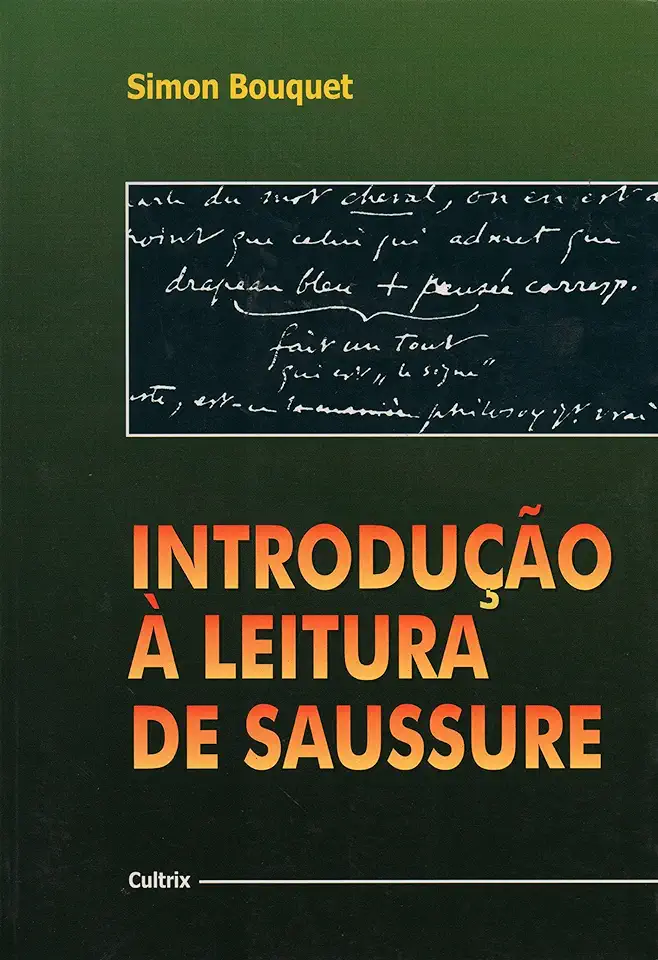
Introduction to Reading Saussure - Simon Bouquet
Introduction to Reading Saussure: Unlocking the Structuralist Revolution in Linguistics
Unveiling the Foundations of Modern Linguistics
In the realm of language study, few figures have left as profound an impact as Ferdinand de Saussure. His groundbreaking ideas revolutionized the field of linguistics, laying the groundwork for the structuralist movement that would shape the course of linguistic analysis for decades to come. In "Introduction to Reading Saussure," Simon Bouquet presents a comprehensive and engaging exploration of Saussure's seminal work, inviting readers to embark on a journey into the depths of linguistic theory.
Delving into Saussure's Revolutionary Concepts
Saussure's contributions to linguistics are vast and multifaceted, encompassing concepts that continue to resonate in contemporary linguistic discourse. Bouquet meticulously dissects Saussure's key ideas, providing lucid explanations and insightful commentary that make even the most complex theories accessible to readers of all backgrounds.
The Dichotomy of Langue and Parole
At the heart of Saussure's linguistic philosophy lies the distinction between langue and parole. Langue refers to the abstract system of language, the underlying rules and structures that govern how words and sentences are formed. Parole, on the other hand, encompasses the actual spoken or written instances of language, the concrete manifestations of the abstract system. Saussure's exploration of this dichotomy revolutionized the way linguists conceptualize language, emphasizing the systematic nature of linguistic communication.
The Signifier and the Signified
Another fundamental concept introduced by Saussure is the sign, which he posits as the basic unit of linguistic analysis. A sign consists of two components: the signifier, which is the physical or acoustic representation of the sign, and the signified, which is the mental concept or idea associated with the signifier. Saussure's analysis of the sign and its relationship to meaning challenged traditional notions of linguistic representation, opening up new avenues for understanding how language conveys information.
Synchronic and Diachronic Linguistics
Saussure also made a significant distinction between synchronic and diachronic linguistics. Synchronic linguistics focuses on the study of language at a specific point in time, examining the structures and patterns that characterize a language at that moment. Diachronic linguistics, on the other hand, investigates the evolution of language over time, tracing the changes that occur in linguistic systems over historical periods. Saussure's emphasis on both synchronic and diachronic perspectives provided a holistic approach to linguistic analysis, allowing linguists to gain a deeper understanding of how languages function and change.
Exploring Saussure's Influence on Linguistics
Bouquet meticulously traces the impact of Saussure's ideas on the development of linguistics, highlighting the profound influence he had on subsequent generations of scholars. From the structuralist movement of the mid-20th century to contemporary linguistic theories, Saussure's legacy continues to shape the way linguists approach the study of language.
Structuralism and Beyond
Saussure's work laid the foundation for structuralism, a school of thought that emphasizes the systematic and rule-governed nature of language. Structuralist linguists sought to uncover the underlying structures that govern how languages function, focusing on the relationships between linguistic elements rather than individual words or sentences. Saussure's ideas provided the impetus for this influential movement, which revolutionized the field of linguistics and influenced other disciplines such as anthropology and literary criticism.
Saussure's Enduring Relevance
Despite the emergence of new linguistic theories and approaches, Saussure's ideas remain remarkably relevant and influential in contemporary linguistics. His insights into the nature of language, the relationship between language and meaning, and the systematic organization of linguistic systems continue to inspire and challenge linguists to this day.
A Must-Read for Linguists and Language Enthusiasts
"Introduction to Reading Saussure" is an indispensable resource for linguists, language enthusiasts, and anyone seeking to understand the foundations of modern linguistics. Simon Bouquet's comprehensive and engaging exploration of Saussure's work provides a clear and accessible introduction to his groundbreaking ideas, making this book a must-read for anyone interested in the study of language.
Embark on a Linguistic Journey with Saussure
Join Simon Bouquet on an intellectual journey into the world of Ferdinand de Saussure, where you will uncover the profound insights that revolutionized the field of linguistics. "Introduction to Reading Saussure" offers a captivating exploration of Saussure's key concepts, providing a solid foundation for understanding the structuralist revolution and its lasting impact on the study of language.
Enjoyed the summary? Discover all the details and take your reading to the next level — [click here to view the book on Amazon!]